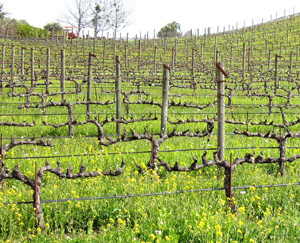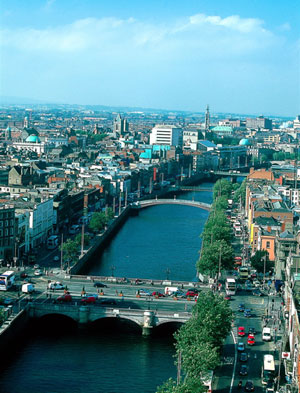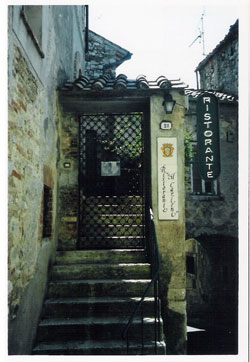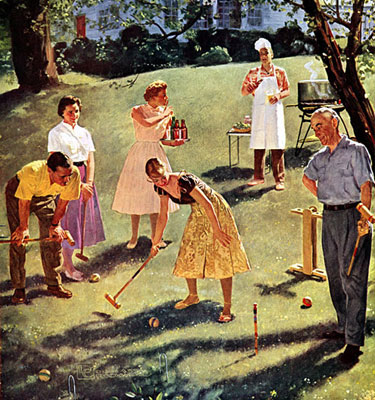 Spring is the perfect time for an off-season weekend in California's Sonoma Valley. Premium rates don't begin until just before the Memorial Day weekend.
Spring is the perfect time for an off-season weekend in California's Sonoma Valley. Premium rates don't begin until just before the Memorial Day weekend.
Off-season extends from the end of harvest in November through mid-May. In December, January, and February there can be a bit of rain, which is good for the grapes. Even for visitors, the inclement weather adds to the valley's charms, especially with so many restaurants serving comfort food and great wines.
During March and April, day time temperatures hover in the mid 60's to low 70's, with the nights still in fireplace-cozy mid-40s. Only a few buds appear on the vines, but brilliantly colored wild flowers are already in full bloom.
Fields of bright yellow mustard plants spread as far as the eye can see. Tall green grasses wet from the coastal air surround mile after mile of still dormant, grape vines. The lifeless looking vines mask the vitality that will burst forth as the day time temperatures climb into the 70's.

 What was supposed to be nothing more than meeting my good friend
Robert – who is like a brother to me – in Dublin, Ireland to celebrate our
birthdays in December, turned out to be something of an excellent
extravaganza. Robert is the CEO of Clive Christian, "the world's most
beautiful kitchens" according to their monthly ad in Architectural
Digest. He had a meeting in Dublin that happened to fall on my birthday
2 days after his. He appears to be a stuffy, British guy with his
finely tailored 3-piece suits with Hermes ties who speaks the proper
"Queen's English", but his biggest claim to fame is that he was a
'roadie' for ABBA back in the 80's. Depeche Mode, another rock band from
that decade was playing in Dublin at the time, so that's what we decided to do
for our birthdays.
What was supposed to be nothing more than meeting my good friend
Robert – who is like a brother to me – in Dublin, Ireland to celebrate our
birthdays in December, turned out to be something of an excellent
extravaganza. Robert is the CEO of Clive Christian, "the world's most
beautiful kitchens" according to their monthly ad in Architectural
Digest. He had a meeting in Dublin that happened to fall on my birthday
2 days after his. He appears to be a stuffy, British guy with his
finely tailored 3-piece suits with Hermes ties who speaks the proper
"Queen's English", but his biggest claim to fame is that he was a
'roadie' for ABBA back in the 80's. Depeche Mode, another rock band from
that decade was playing in Dublin at the time, so that's what we decided to do
for our birthdays.  Open and become a part owner in a restaurant in Italy? Sure, why not?
That’s exactly what happened several years ago when chef Jeremiah
Tower and I decided to try our hand at operating a ristorante
in a small hill town in Umbria, Italy. What no one tells you before
you arrive to attempt such an endeavor are the hoops you must jump
through, and the circus-type feats you must attempt to get the
necessary licenses and permits to start a business in Italy as a
foreigner. Madonna! It was like trying to squeeze olive oil
out of Cararra marble. Endless meetings with lawyers, police chiefs,
and building inspectors and we still didn’t have the necessary permits
and documentation to operate a business.
Open and become a part owner in a restaurant in Italy? Sure, why not?
That’s exactly what happened several years ago when chef Jeremiah
Tower and I decided to try our hand at operating a ristorante
in a small hill town in Umbria, Italy. What no one tells you before
you arrive to attempt such an endeavor are the hoops you must jump
through, and the circus-type feats you must attempt to get the
necessary licenses and permits to start a business in Italy as a
foreigner. Madonna! It was like trying to squeeze olive oil
out of Cararra marble. Endless meetings with lawyers, police chiefs,
and building inspectors and we still didn’t have the necessary permits
and documentation to operate a business.
 So I had some time to kill in Europe before my boyfriend (now husband) was to join me on our first international adventure. While I "knew" French from high school and college, I was not proficient or confident enough to spend two weeks by myself in a country where I could not really understand or be understood. I could kick my wine-loving self now, but c'est la vie. England was too expensive as a solo traveler, so I decided to go to Ireland.
So I had some time to kill in Europe before my boyfriend (now husband) was to join me on our first international adventure. While I "knew" French from high school and college, I was not proficient or confident enough to spend two weeks by myself in a country where I could not really understand or be understood. I could kick my wine-loving self now, but c'est la vie. England was too expensive as a solo traveler, so I decided to go to Ireland. Walking at a brisk pace down the narrow roads of Florence, on my final night in the city before leaving for Rome, I found myself skipping the turn to my apartment, for something much more appetizing than a healthy amount of sleep – in fact something much more unhealthy—a croissant filled with chocolate.
Walking at a brisk pace down the narrow roads of Florence, on my final night in the city before leaving for Rome, I found myself skipping the turn to my apartment, for something much more appetizing than a healthy amount of sleep – in fact something much more unhealthy—a croissant filled with chocolate.
